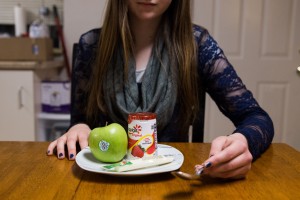Provo is home to more than 20 counselors and groups dedicated to helping people who suffer from eating disorders.

BYU Women’s Services and Resources offers a support group to women who are struggling with eating disorders and body image. The group Fed Up With Food has been meeting for more than 10 years.
A 2011 article from the South Carolina Department of Mental Health website reports that 7 million women and 1 million men in America suffer from an eating disorder. One in 200 American women suffer from anorexia and two to three in 100 suffer from bulimia.
BYU Women’s Services and Resources manager Tiffany Turley said the defining point of the group is the mentoring program that pairs up mentors with participants. Mentors are women who have overcome their own eating disorders. They are chosen through an interview process that emphasizes their ability to empathize with the participants.
Fed Up With Food leader Megan Kennedy said group participants often struggle with issues related to food or eating. They may wonder how they will ever get out of their ordeals, or if it is even possible to overcome them.
“But when the participants work with a mentor who has gone through the recovery process, it brings a lot of hope,” Kennedy said. “They are able to see that recovery is possible and they can get through their struggle. That can be really powerful.”
Fed Up With Food helps participants know where to turn for more intensive treatment. It is primarily a support group, not a therapy group. Group leader and nutritionist Lauren Absher encourages the participants to seek treatment from individual therapy and nutrition sessions.
Group leader Amy Frandsen has seen how being a part of the support group can help a person struggling with an eating disorder.
“There was one girl who said, ‘I had a doctor who told me that recovery is really, really hard, and it’s going to be a lot of work, a lot of people don’t ever recover,'” Frandsen said. “She has had that in her head and in her heart for years, but being in a group and seeing people who were on the other side helped her realize that that wasn’t true, and gave her hope and something to look forward to. That is the beauty of this program.”
The group is currently exclusive to women, but leaders are considering opening the group to include men. The group recently restructured its program to include principles of the LDS Church’s 12-step addiction recovery program, which applies gospel principles to foster recovery.
Eating Disorders Anonymous is another Provo support group dedicated to helping people fight and overcome eating disorders. Eating Disorders Anonymous operates as a branch of the Utah Twelve-Step Information Network. The Provo section of the group was started in 2004 and is currently run by founder Bonnie Shepherd.
The non-denominational group is open to both men and women. The Eating Disorders Anonymous program is based on Alcoholics Anonymous principles and uses the 12-step system but is not explicitly focused on therapy. The 12-step program is a personal journey for participants who learn to improve their relationship with food and their own self-image. But the group itself focuses on support and encouragement within its meetings.
Shepherd said it is not a therapeutic group or associated with therapists, but “a group where (they) give out information.”
“We don’t cross-talk or anything,” Shepherd said. “People are just allowed to share their feelings.”
Eating Disorders Anonymous employs a milestone program to mark progress. Their website defines milestone as “a self-defined marker on the journey to recovery.” These milestones serve as moments of success in a difficult journey upward, according to Shepherd.
Shepherd said using milestones helps group members focus on their successes, rather than on what they did wrong or how society perceives them.
“It reminds us that, ‘Maybe I did not act out on my binging behavior or my bulimic behavior every day this week,'” Shepherd said. “‘Maybe this week I only acted on it one day’, and that’s progress.”
Provo offers many support groups to those who suffer with eating disorders. Each employs a different approach, but they have similar goals of promoting healthy living and positive self-image.
“Having an eating disorder, you have a lot of shame,” Shepherd said. “You feel really guilty about it. It isn’t anything to be ashamed of. You can make changes in your life, and you don’t have to stay in the shadows.”




